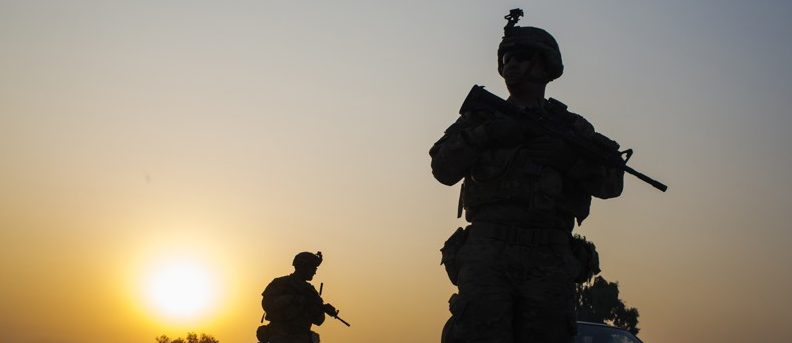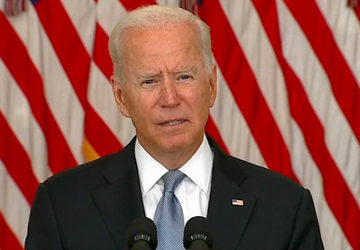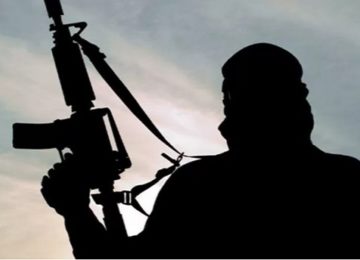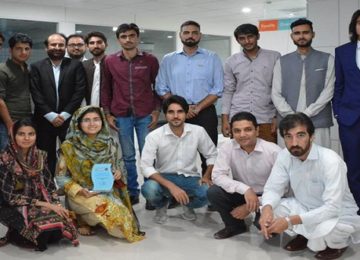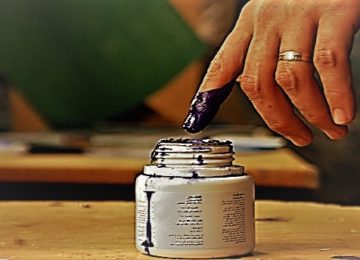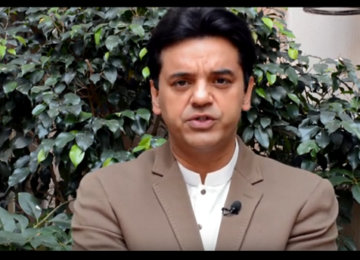As part of their review of military strategy in Afghanistan, both President Ashraf Ghani and the Commander of United States and NATO forces in Afghanistan, General John Nicholson, have honed in on the Ministry of Interior as a critical weakness in the government’s fight against the Taleban. The Afghan National Police, a paramilitary force, is more likely than the army to be on the frontline, guarding the population against attack. Yet corruption continues to bedevil it, draining resources and diminishing morale. Both men believe that reform of the MoI – eliminating or at least reducing corruption – is central to turning the war against the Taleban around. AAN’s Kate Clark looks at what they are up against.
This is part two in a mini-series of dispatches looking at military strategy. The first assessed the state of the conflict and options facing the United States and Afghan governments. This dispatch focuses on an issue which both see as central to getting a battlefield advantage over the Taleban: reform of the MoI.
The research for this dispatch was supported by a grant from the Open Society Foundations.
On 8 May 2017, President Ghani called the Ministry of Interior (MoI) “the heart of corruption in the security sector” and said cleaning it up would be his focus this year. He reiterated his resolve during his opening speech at the Kabul Process conference on 6 June 2017:
Let me summarize the [reforms] most relevant to peace. The key to our negotiating credibility will be whether we succeed in reforming our security sector. I have said elsewhere and I will repeat again here that the cutting edge for our security reform strategy is whether we succeed in reforming the Ministry of Interior.
General Nicholson, in turn, in his testimony to Congress in February 2017, said corruption – in appointments, in the supply chain and in paying salaries – was one reason for high casualty rates in the ANSF; it is draining resources, he said, and undermining combat effectiveness.
Nicholson was referring to both the MoI and the Ministry of Defence (MoD), and both the ANP and the Afghan National Army (ANA). However, the ANA, set up mostly from scratch as a national, multi-ethnic and non-factional body, was never as captured by factional or criminal interests as the ANP, which developed out of anti-Taleban armed groups who seized provinces and districts in 2001. “In the Ministry of Defence, the problem is contracts,” one senior American officer told AAN. “In the MoI, it is everything.” As to what that ‘everything’ might be, a useful list was given in the 2016 Bilateral Financial Commitment (seen by AAN) signed by the MoI and the part of the NATO mission which oversees and administers security funding, the Combined Security Transition Command–Afghanistan, better known as CSTC-A:
The term “corruption” refers to instances in which an official or employee in a position of power or authority misuses that position, either for personal gain or other wrongful motive. Corrupt acts include: misappropriation of resources, embezzlement, accepting or offering bribes, “bid-rigging” (which is the award of a contract under fraudulent or dishonest conditions, usually in exchange for a “kick-back” fee or other personal gain), trading in influence (which is when a person makes an official decision or action in exchange for a fee or other personal gain), obstruction of justice, and other abuses of position and wrongful enrichment.
Corruption in the MoI actually goes beyond this to what the United Nations Office of Drugs and Crime (UNODC) calls ‘grand corruption’ ie using government positions for perpetrating crime, such as racketeering, extortion, smuggling and involvement in narcotics. (1)
Appointments and the economy of the MoI
Many authors have described how the nexus of the problems in the MoI is how appointments are made. In November 2014, AAN had a frank discussion on the subject with then Minister of Interior Omar Daudzai. He revealed that he set aside every Wednesday afternoon – a tenth of his official working week – to receive MPs who were petitioning him for jobs for friends, family and clients. This was not the only time he saw MPs. Some who were “friendly,” he said, would come every day, some with scheduled meetings, others not. He also had to see jihadi leaders, cabinet members and others, all also lobbying for positions for their clients. Although he claimed he had stamped out the practice of posts being bought and sold in the ministry (more on which, below), he did admit that he had failed to withstand political pressure and personal connections. (2)
The pressure to appoint the clients of the well-connected goes beyond the interior ministry – President Ghani in his inaugural speech asked MPs not to have private meetings with any ministers. However, in the MoI, the ‘economy of appointments’ is probably the best developed. Even lower grade jobs are for sale, and for posts in big cities or with good money-making potential, for example in opium-growing areas or with control of border crossings, the prices, in dollars, are reportedly in the five or six figures. (3) One study by Integrity Watch of the Kabul police in 2015 described “a cycle of corruption and impunity, in which police officers have strong incentives to engage in corrupt practices in order to secure their current positions and ensure their prospect of next posts.” The system rests on intermediaries, the authors said, who bring together offers and demands for MoI positions. “Typically an up-front payment is required,” it quoted one respondent as saying, “followed by regular monthly payments.”
The consequences are clear: if positions are paid for, the expense needs to be recouped and that, almost inevitably, means police involvement in crime, including racketeering and drug smuggling, and/or making money from the ministry itself. This ranges from crooked contracts and pocketing the salaries of policemen who do not exist, to so-called ‘ghost policemen’. One advisor at the MoI, speaking to the author in 2010, described the system as “a vertically-integrated corruption syndicate” which “is not like a standard patronage system where money flows down in exchange for loyalty; rather, officials on the periphery move money upwards, in exchange for licence [to commit crimes].”
Integrity Watch pointed out that an integral part of this system is protection for criminal activities, ie immunity from prosecution:
…[T]his then allows the extortion and collecting the resources that are then channelled back (in form of periodic payments or fees for buying the next post) to those who make the appointments and ensure job security for these officers. This is a self-perpetuating system since all actors depend on each other for the benefits that they receive and do not have incentives not to play with the rules of this system. In fact, police officers who engage more in corrupt practices seem more likely to secure better positions since they can afford buying it.
The impact of corruption
In many areas, police are, along with teachers, the ‘face’ of the state, the government employees Afghan citizens are most likely to encounter. When they extort money from travellers and protection money from shopkeepers and landlords, the legitimacy of the state is poisoned. (For detail on bribe-taking and how a proportion of the money gets channelled up to senior ranks, see the Integrity Watch report cited earlier.)
The way that corruption also prevents the ANP from being an effective fighting force should be obvious. Corruption depletes resources. This is especially damaging to those on the frontline where shortages of ammunition, equipment, fuel and even food have been reported (see, for example, here and here). Creating ghost policemen means a depletion of forces not obvious until a crisis occurs. Appointing people at mid and senior ranks on the basis of payments or political connections undermines leadership, especially if those individuals consider their posts to be ‘dual use’, for making money, alongside their regular ministry or policing duties. As for those in the lower ranks, it is difficult to imagine why they would fight and die when they see the leadership enriching itself. One searing piece by Reuters in 2016 on the high numbers of police and soldiers leaving the ANA and ANP described how:
The army has been running adverts on prime-time television that show inspiring images of resolute soldiers on training exercises, eating in well-stocked mess halls and with good kit.
But on the frontlines, army and police deserters complain of commanders having no answer for deadly ambushes, no broader strategy for prevailing in the war, corruption among their leaders and poor food and equipment. “Barely a day passed without gunfire, ambushes, roadside bombs,” said Farooq, a police officer from Helmand province, who quit his job three months ago. “We were treated as if we had no value and our job was to get killed.”
In such circumstances, ANP abandoning their posts or making no-fight deals with the Taleban appears rational.
One telling example of how corruption can play out to the detriment of the lower ranks can be seen in the persistence of the use of static checkposts by ANP and ANA, despite a direct correlation with higher ANSF casualties (as reported by NATO’s Resolute Support mission). Deploying a few policemen or soldiers to each of many, spread-out checkposts (the ANP has 7,300 and the ANA 1,110 static checkposts nationwide) leaves those police and soldiers vulnerable to attack, while doing little to protect the local population or territory and complicating supplies and reinforcements. Yet, the move to consolidate checkposts into larger, defensible platoon-sized (tolai) bases has been met with resistance:
… local commanders are reticent to consolidate checkpoints because, in some instances, they provide the commanders with illicit income. Beyond the resistance from provincial governors and local powerbrokers, senior MoD and MoI leaders have been either unwilling or unable to enforce President Ghani’s continued directives to posture the force more effectively and to reduce reliance on static positions.
The role of the donors
The donors should have a lot of clout. They largely pay for the ANSF, with the US contributing the vast bulk of the money: 4.5 billion US dollars a year, compared with one billion from other countries and half a billion from Afghanistan. The Law and Order Trust Fund (LOTFA), a multi-donor mechanism administered by the United Nations Development Fund (UNDP) has, since 2001, been channelling donor money to the Ministry of Finance for “funding police salaries, improving police capacity and developing systems within the Ministry of Interior Affairs.”
The historical role of the donors has been questionable. The US, in particular, has been criticised for its push to expand an un-reformed ANP from 2007 onwards. The reasons was the US’ desire to get more boots on the ground to fight the Taleban at all cost, leading to a focus on the quantity of policemen, rather than quality, and to a paramilitary, rather than a civilian force. Battlefield expediency, then and since, has, too often, meant the US military turning a blind eye to corruption and abuses (see for example here, here and here).
The senior US military leadership now seems to have realised the importance of reforming the MoI and the MoD, if the Afghan state is to have a chance in defending territory against the Taleban. This looks to be a practical realisation, similar to the decision in 2009 to reduce civilian casualties because they were harming America’s war effort. By contrast, during the last serious attempt at reform of the MoI in 2005-7 (which is looked at in detail below), those involved reported the US military as sometimes being indifferent or hostile to reform. Now there seems to be a genuine recognition by US officers and diplomats that corrupt and incompetent leaders are directly harming ANSF morale and their ability to fight.
As to how the MoI could be reformed, various means are possible: greater accountability (over contracting, salary payments, use of resources, etc.); professionalisation, ie a better trained force; ‘merit-based’ appointments, a term both Ghani and Nicholson use; and the threat of prosecution.
Accountability measures
Tightening up financial and monitoring systems should make stealing resources more difficult. In October 2014, President Ghani set up the National Procurement Commission (NPC), which he chairs and Chief Executive Abdullah and various senior ministers are members of. The NPC reviews all government operations and maintenance contracts above 300,000 US dollars and construction contracts over 1.5 million US dollars. Since its creation, it has reviewed contracts worth 200 billion Afghanis (almost three billion dollars) and, said a recent UNAMA report on corruption, “enforced contracting standards and reduced corruption.” Ghani reported that an NPC review of MoI contracting, which reviewed 900 contracts awarded by the ministry, found that compliance with procurement law and best practices was the “rare exception rather than the rule.” After restructuring the bids to comply with the law, he said the NPC estimated it had saved USD 350 million in its first year.
The NPA has revoked the MoI’s procurement authority, and both MoD and MoI procurement departments have been completely or partially re-staffed (which has also led to delays in routine purchases). General Nicholson described this as a move “to reduce criminal network penetration.” Despite these efforts, at the start of 2017, CSTC-A took back managing the purchase of fuel and medical and pharmaceutical supplies for the MoI and MoD because of “corruption and low-quality product substitution.” In SIGAR’s latest report, CSTC-A was quoted as saying that “corruption and ethical concerns continue to hamper MOD and MOI contracting.” Since 1 January 2017, LOTFA (apparently at the instigation of the US military) has also only been funding the salaries of individuals validated as being on the tashkil (the agreed number of individuals at particular ranks in an organisation), in an attempt to ensure policemen exist and are paid.
These sorts of reforms, if they create sustainable systems, should ensure there is less room for graft. However, they do nothing to tackle the more significant problem of buying and selling of appointments and the crime which follows on from that.
‘Professionalising’ the force
A focus on training, as a way to get professional police into the mid and senior ranks with the aim of promoting meritocracy and thereby reducing corruption, has had limited effects, according to research by Integrity Watch in 2015. Looking at the police in Kabul, which has received the most resources and efforts, the research concluded:
The number of uneducated officers who were connected to militia factions and controlled Kabul police in early years after the fall of the Taliban has declined, and Kabul police looks more representative in terms of ethnic, political and regional background of its leadership. Yet Kabul’s police remain to a large extent dominated by officers who are appointed based on connections or other corrupt practices, rather than merit and qualifications.
The study found there were more professionally-trained officers, but they tended to get stuck in middle ranking positions while those connected to political factions or corrupt networks were being promoted to senior positions, often over their heads. In the past, it was the old militia factions which had exercised the strongest influence over ANP appointments, the authors said, but now members of parliament “have also become influential in senior appointments to both MoI and ANP.” They also point out that having professionally-trained police officers does not automatically lead to ‘professionalism’, if those men (and occasional women) have to appeal to sources of patronage in order to get promoted, and may then pursue corrupt practices. Indeed, they point to “the continued involvement of Kabul police in criminal and corrupt activities” and describe how parts of the force are basically “corrupt, pyramidal networks that engage in racketeering and extortion from the population instead of protecting citizens and enforcing the rule of law.” The parallel report looking at senior appointments nationwide, published in 2014, painted an even bleaker picture. (4)
Dealing with the ‘appointment problem’
The underlying problem at the MoI is political which means that technical fixes, such as greater accountability over spending and better training, important though they are in their own right, will never be enough to bring about fundamental change. The main example of a concerted attempt to deal with the ‘appointment problem’ was the Pay and Rank Reform of 2005-07 and this did partially address the political aspect of corruption at the MoI. Why these reforms worked, but did not last is instructive.
The aims of the Pay and Rank Reform were: 1) Restructure a top-heavy police force by reducing senior officer positions; 2) Institute a rigorous process for testing and selecting officers based on merit rather than personal and factional connections and bribery; and 3) Increase pay to facilitate recruitment and retention and reduce corruption.
To stay in post, generals had to sit exams to ensure they were literate and knew the law. They were also given background checks to try to root out those who were committing crimes, torturing people or abusing their positions for financial gain. (5)
The number of generals in the ministry was cut from over 340 to 120, colonels from 2450 to 301 and lieutenant colonels from 1824 to 467. Meanwhile, numbers in the lower ranks were increased. (6) Salaries were increased to bring them into line with the ANA. President Karzai almost derailed the reforms when, in June 2006, his choices for new provincial police chiefs and other senior positions included 14 generals who had failed the exam or the vetting. According to Human Rights Watch, they included human rights abusers, warlords and drug-traffickers, with several accused of murder, torture, intimidation, bribery, government corruption, interfering in police investigations and links to illegal armed groups. An unusually strong international reaction led to Karzai agreeing to a ‘probation board’ for the 14 and to him eventually standing down 11 of them.
The Pay and Rank reform succeeded only because of a great effort by reformers inside the ministry, detailed knowledge and hard work from some donors and UNAMA, and pressure on President Karzai from international donors. The US military (but not the State Department) was lukewarm or unhappy about the programme, seeing the immediate priority as battling the Taleban and feeling there was no time to ‘mess around’ with armed forces that were needed on the battlefield. However, there was enough buy-in from other international actors to push it through.
Maintaining those reforms proved impossible, however. In the years after the Pay and Rank Reform, as diplomats changed and the institutional memories of embassies proved weak, reformers inside the ministry found they lacked clout in the absence of international support. Karzai, who had never been keen on the reforms, was also to stay in power for another seven years. In Afghanistan, generals in the police, army and NDS are appointed by presidential decree and cannot easily be sacked. For that, they have to be prosecuted and sentenced to at least one year in prison or marry a foreigner or disappear. Even if a general is corrupt, committing abuses, is illiterate or ineffective, once he gets into the most senior higher ranks, it is basically a position for life (Article 49 of the Police Law 1393/2014). That meant that many of the ‘sacked’ generals bided their time in the reserves (ihtia’at), still receiving a salary, government car and bodyguards, and then lobbied for jobs in the MoI again.
Many did manage to get back into the senior ranks. Others cut their losses, going on to become MPs in the 2010 elections or obtaining other government positions. Several younger brothers or sons went into the MoI at senior positions, so networks and family fortunes were maintained. Given that the creation of generals is a form of political patronage, the distorted, top-heavy shape of the interior and defence ministry tashkils also re-assembled themselves.
Since taking office, Ghani has retired 150 generals from the MoI, MoD and NDS who were still in post despite being over-age. There has also been a bid to get young officers with international training moving up through the ranks (he was reportedly infuriated when he heard many were languishing in the reserves). The ministry also told the Independent Joint Anti-Corruption Monitoring and Evaluation Committee (MEC) that, during several months up to March 2017, 1400 officials at the MoD had been dismissed on charges of corruption and been replaced by “young and committed individuals”. (7) There were also 13 new appointments to the MoI on 18 May 2017, most notably General Murad Ali Murad who was brought over from the MoD (one idea from the government is to try to bring in officers from the relatively clean MoD to help support reform at the MoI). According to Ghani, this signalled a move towards “the same generational change in the MoI that we have delivered in the Ministry of Defense.”
Whether this is all just a re-shuffling of the same pack, which will make little difference, or the start of something more serious and sustained, is not yet clear. For ‘merit-based’ appointments to work, there would have to be some transparency over the system; that is not there yet. (8)
Prosecutions
There have also been some recent prosecutions of officials in the MoI and MoD, including through the new Anti-Corruption Justice Centre which began its work in November 2016. Up until now, the centre has processed at least 60 cases, involving government officials from various ministries accused of embezzlement, bribery, usurpation of public land and illegal mining. They include the former head of monitoring for the Procurement Department at the MoI, who was sentenced, on 9 January 2017, to 12 years imprisonment for bribery, related to fuel contracts. The ANA 215 corps commander in Helmand was also arrested in March 2017 on charges of neglect of duty and theft of supplies and food meant for his soldiers. His predecessor and other officers had earlier been relieved of duty after it was found that half of the men supposedly on the tashkil and receiving salaries were non-existent ‘ghosts’. (Helmand is one of the provinces where the Taleban have made the greatest gains in the last two years, as AAN has reported, here and here).
Such high level prosecutions could create some fear among those working in the MoI over the consequences of abusing state positions. Attorney General Muhammad Farid Hamidi appears serious about this anti-corruption drive, although he has many, many tasks on his plate. However, prosecuting offenders does not deal with systematic corruption, especially if power brokers continue to be able to protect clients and prosecutions focus on the less powerful or less protected while leaving the major players free.
What prospects for radical reform now?
Reading through earlier reports on the police over the last decade – from the International Crisis Group, AREU, Integrity Watch and RUSI, published between 2007 and 2015 – most conclusions could be cut and pasted here: on how difficult the task of reforming the MoI is and yet how crucial, how the problem is basically political but the solutions chosen tend to be technical and therefore make little impact, and that, for there to be success, there needs to be support both from the top level of government and the international powers. Most of the studies also called for international funding of the MoI and ANP to be conditional on getting comprehensive top-down reform.
The change in the attitude of senior US military leaders, seeing reform to the MoI as critical, seems genuine and as always, the US military is optimistic about its ability to get things done: “Where the US funds,” one senior officer told AAN, “it can apply pressure.” However, efforts are likely to be sustained only if the US leadership continues to believe reform is necessary for the war effort.
Currently the US military appears to be the prime mover behind making some security funding conditional (no salary payments for police – or local police and soldiers – unless they are validated as being on the tashkil, and conditionality coming in for biometric registration, equipment inventories and other measures). Tightening up the accounting is always good, but will not be sufficient to effect real change in the ministry.
Among the many donors who, through LOTFA, pay for the ANP whom AAN has spoken to over the past few years, there has appeared a marked reluctance to get involved in who gets appointed. Donors are far more comfortable speaking about technical and administrative reforms and shy away from discussion of who is actually running the MoI. It is a tricky question, of course, whether donors have the capability or the ‘right’ to try to influence government appointments in a state which is sovereign, but which they fund. What can be said is that there appears both less detailed knowledge of the personalities at the MoI among international actors than in 2005-7, including on the background and standing of senior officers, and a greater reluctance to ‘interfere’. (That reluctance is less marked among US officers.)
On the Afghan government side, it might have been thought that the withdrawal of almost all international combat troops at the end of 2014 would have been a wake-up call to those in the MoI who had been busy making money illegally out of their positions in government; if they wanted to preserve the state, they would have to work for its defence. However, the ‘wolf at the door’, with the Taleban persistently taking more territory since 2014, does not appear to have changed the calculation of those milking the system. Possibly, it will not change as long as the US military continues to fund the ANSF and will step in militarily when the Taleban threaten provincial centres. Maybe, also, those making money out of the ANSF can live with the insurgents eating up the ‘periphery’ of the country. (9)
The National Unity Government has certainly proved an institutional block on getting anything much done at all, including reform of the MoI. The fact of having two men in power who both believe they won the election has meant endless delays over appointments. The competency of a candidate has been just one factor considered, along with factional allegiance, ethnicity, old alliances and rivalries and the necessity of rewarding supporters from the election. Those other factors would always have mattered, but have been magnified by the inherent conflict at the heart of the National Unity Government. (10)
Despite the grave threat the Taleban insurgency poses and the apparent readiness of the US military and others to support reform, it is still not clear whether Ghani can galvanise the broad-based domestic political support that will be needed. He will need to persuade others in government to trust him not to be using the excuse of reform to clear out political rivals.
Although the Taleban threat makes tackling MoI corruption urgent, a senior official in the ministry assessed the chances for success as poor. Reform is more difficult now than it was a decade ago, he told AAN, because “the mafia networks are more consolidated.” He also pointed out that the prospect of elections incentivises both corruption and getting or keeping control of the ANP. “The police are useful for amassing a war chest to fund election campaigns,” he said, “but even more significantly, the police are necessary for anyone wanting to rig an election. I think overhauling the senior ranks, getting honest policemen in at the top is impossible in the run up to parliamentary and especially to presidential elections.”
Reforming the MoI may be an impossibly difficult task. However, not reforming it, if the Afghan state is to withstand the Taleban, would also not seem to be an option.
Edited by Martine van Bijlert
(1) See M Shaw, “Drug Trafficking and the Development of Organized Crime in Post-Taliban Afghanistan”, Chapter 7 in D Buddenberg and William A Byrd (Eds), Afghanistan’s Drug Industry: Structure, Functioning, Dynamics, and Implications for Counter-Narcotics Policy, Washington, DC: UNODC and World Bank, 2006, pp 189–200.
(2) See also Daudzai’s comments to a conference of provincial police chiefs in Kabul on 14 October 2014, “Personal connections and political influence have played a role in appointments, transfers and promotions over the past one year. As the interior minister, I accept my failure in prevention of this.” Tolo TV, monitored by the BBC.
(3) Isaqzadeh and Giustozzi, in their 2015 report for Integrity Watch produced the following ‘price list’ for appointments garnered from their respondents in the ministry and ANP: Provincial Chief of Police (CoP): $50-200,000; District CoP: $20-50,000; Head of Passport Unit Kabul: $200,000; Department Head in the MoI: $100,000; Customs Post Commander: $100,000.
(4) Some respondents gave examples of what they believed were corrupt or nepotistic appointments: the former secretary of an influential governor with no experience of policing appointed as a senior MoI official; a district police chief in Balkh being rotated between two districts near each other, contrary to rotation practices; a police officer responsible for a highway in northern Afghanistan in position for ten years, contrary to the three-year rotation rule, who either has strong political protection, or keeps buying his position; a policeman in Kabul promoted to colonel and head of district 16 months after joining the police – he is now trying to become general; the head of a ‘security ring’ in Kabul becoming colonel in three months and commander in six months, despite spending half his time in Dubai and managing his personnel from there; the chiefs of three police districts in Kabul who are brothers of MPs, none with more than one or two years of experience in the police and who are supervising subordinate officers with 15 to 20 years experience; the ex-shopkeeper who is now head of one of Kabul’s police districts despite having no police education or even short-term training; the nephew of a deputy minister who became colonel after attending a six-month police course.
(5) A selection process was developed consisting of five components: 1) written application 2) written test 3) file review 4) human rights vetting by UNAMA and the US Department of State and 5) interview before a selection board with Afghan and international members. The results of the individual interviews were used to rank candidates numerically. If officers were not selected at their current rank they were given the option of competing for a position at the next lower rank, with the incentive of considerably higher salaries than they were receiving previously at a higher rank. This process continued until they were selected, decided to retire, or reached an age limitation (General 65 years old, Colonel 55, Lieutenant Colonel 52, Major 50). Officers who were not selected were offered a severance package of one year of pay based on the higher salary scales.
(6) The full tashkil – before/after – was: Generals 340+/117, Colonels 2450/301, Lt Colonels 1824/467, Majors: 2067/580, Captains 2762/1057, 1st Lieutenants 1705/1518, 2nd Lieutenants 1834/2756, (3rd Lieutenants – rank removed) Sergeants 4800/9324, Patrolmen 36,600/45,880 (source: CSTC-A, January 2007, quoted here).
(7) Less convincingly, said MEC, on March 25 2017, the Ministry of Defense announced it had “swapped” the posts of at least 1000 officials accused of corruption in its Procurement and Finance departments. “While the MoD should be commended for identifying its corrupt officials,” said MEC, “its choice of remedy is highly questionable.”
(8) Ghani recently appointed Amrullah Saleh, a former Jamiat-e Islami stalwart, founder of the Green Movement and former head of the NDS, as ‘State Minister for Security Reforms’ in March 2017. His duties include advising the president on the appointment of new security officers, monitoring and implementation of a professional growth plan for high officers and giving advice on bringing about reforms in security departments. It is not yet clear how this appointment is going to pan out or whether Saleh will make fundamental changes to how appointments are made.
(9) Allegations of enrichment are occasionally made publically. See, for example, this recent Tolo investigation into generals who live “the high life in Kabul mansions, far beyond their apparent – according to their salaries – ability to pay for it.
(10) Evidence for how much inertia and mistrust there is in the government can be seen in what happened after the Taleban captured and subsequently lost Kunduz in 2015. Both independent analysis and internal reporting pointed to this as among the causes of the fall of the city. Kunduz had been made ripe for the Taleban to take by the weaknesses and rivalries within the provincial government and ANSF which were related to National Unity Government rivalries. Added to that was the impunity enjoyed by pro-government militias who predate on the population. Despite the shock of losing Kunduz, however, nothing has changed and Kunduz remains vulnerable to Taleban attack (see here and here).
By Special Arrangement with AAN. Original link.
Disclaimer: Views expressed in the article are not necessarily supported by Afghan Studies Center.



